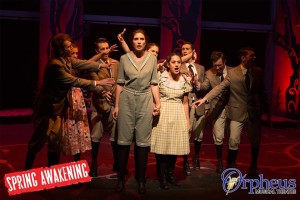Spring Awakening: The Musical – Effective presentation of the subject matter

Review of Spring Awakening: The Musical
Spring Awakening: The Musical
Book and lyrics by Steven Sater
Music by Duncan Sheik
Based on the play by Frank Wedekind
Orpheus Musical Theatre Society
Much of the subject matter of Spring Awakening — both the original play and the musical — make Philip Roth’s once-controversial novel Portnoy’s Complaint seem comic-book light.
Playwright Frank Wedekind wrote Frühlings Erwachen (Spring Awakening) in 1891, attacking German bourgeois society for its repressive attitude, particularly towards young people. The play — originally sub-titled A Children’s Tragedy — was considered scandalous because of its explicit sexual content and was banned on publication. Another 15 years passed before it appeared on stage in Berlin.
The content makes it an even more unlikely subject for a musical — even a rock musical — than Sweeney Todd by Stephen Sondheim and Hugh Wheeler. However, both were Tony Award winners, Sweeney Todd in 1979 and Spring Awakening in 2006. The musical, with book and lyrics by Steven Sater and music by Duncan Sheik, also won Drama Desk and Olivier awards.
Yet, even in the sexually liberated west in 2016, the content remains controversial. The portrait of the uncomfortable transition from adolescence to adulthood offers simulated heterosexual intercourse/sexual assault, suggested male masturbation, wet dreams, a little sado-masochism, a short homosexual love scene, a back-street abortion and references to sexual and physical abuse and abandonment. All this is capped off by the deaths of two of the principals, one by suicide and the other because of a botched abortion.
Although there is some doubt about the wisdom of such a make-or-break selection, as Orpheus Musical Theatre Society apparently reaches out to younger audiences with a daring show, there is none about the quality of the production. Director Chantale Plante, musical director Paul Legault and particularly choreographer Lola Ryan present a fluid, well-timed production with a well-chosen cast.
Philip Merriman as Melchor Gabor, the rebellious thinker, and Justice Tremblay, as the innocent and ignorant Wendla Bergmann, are well-matched, while the tousle-headed Cameron Jones is convincingly confused as Moritz Stiefel. John Collins is very effective in each of the nine cameos of various male adults crossing the teenagers’ lives.
Among other high points through the show are Rachael McAuley’s presentation of the Blue Wind number, the boys’ dance numbers, Alexandra Uhlenberg’s sparkle and Jesse Levy’s rounded characterization of Martha.
Spring Awakening: The Musical continues at the Centrepoointe Studio Theatre to September 25..
Director: Chantale Plante
Musical Director: Paul Legault
Choreographer: Lola Ryan
Set: Graham Price
Lights: Seth Gerry
Sound: Mark Tye
Costumes: Guylaine Roy
Cast
The Girls:
Wendla Bergmann…………………………………………………Justice Tremblay
Martha Bessell……………………………………………………..Jesse Levy
Anna……………………………………………………………….Michelle Gendron
Thea………………………………………………………………..Alexandra Uhlenberg
Ilsa Neumann………………………………………………………Rachael McAuley
The Boys
Melchor Gabor……………………………………………………..Philip Merriman
Moritz Stiefel………………………………………………………Cameron Jones
Ernst Robel…………………………………………………………Brandon Nguyen
Hänschen Rilow…………………………………………………….Cullen McGrail
Georg Zirschnitz……………………………………………………Patrick Teed
Otto Lammermeier………………………………………………….Bryn Orth-Lashley
The Adults:
Frau Bergmann et al………………………………………………..Alison Enid Foley
Headmaster et al……………………………………………………John Collins
Ensemble:
Katrina Belohoubek, Bebe Brunjes, Kamie Rice, Stéphanie Stroud
Band:
Conductor/keyboard………………………………………………Paul Legault
Guitars…………………………………………………………….Pete Forêt
Violin……………………………………………………………..Sophia Pan
Cello………………………………………………………………Steve Smith
Bass………………………………………………………………Tom McMahon
Drums…………………………………………………………….Mark Rehder